NEWS ROUNDUP
Revive ‘Made in Washington,’ Amazon vs. its workers, jailing the poor…
Monday, May 16, 2016
STATE GOVERNMENT
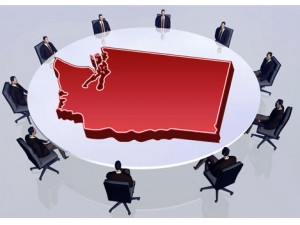 ► MUST-READ in today’s News Tribune — ‘Washington-made:’ Is it just a slogan? (by Larry Brown and Mark Martinez) — Washington’s economy is on dangerous footing. State leaders are creating a very inhospitable and uncertain regulatory environment for those who want to invest in business ventures here and employ our skilled workforce. Leaders must dedicate themselves to creating an economic environment that provides predictability for investment, adaptability to the changing needs of a global economy, and equally valuing our blue- and white-collar workers. This will ensure an environment that fosters opportunity for all.
► MUST-READ in today’s News Tribune — ‘Washington-made:’ Is it just a slogan? (by Larry Brown and Mark Martinez) — Washington’s economy is on dangerous footing. State leaders are creating a very inhospitable and uncertain regulatory environment for those who want to invest in business ventures here and employ our skilled workforce. Leaders must dedicate themselves to creating an economic environment that provides predictability for investment, adaptability to the changing needs of a global economy, and equally valuing our blue- and white-collar workers. This will ensure an environment that fosters opportunity for all.
► In today’s (Everett) Herald — It’s Supreme Court turn to judge lawmakers’ progress (editorial) — Individual assessments of how the legislators’ report on education funding will be received by court justices has ranged from Democrats admitting that more could have be done to Republican indifference to the court’s reaction.
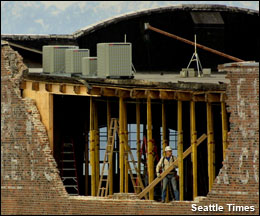 ► In the Seattle Times — Buildings that kill: The earthquake danger lawmakers have ignored for decades (special report) — Seattle officials have been counting earthquake-vulnerable buildings since the early 1990s. There are at least 1,163 of them. At any given moment, at least 26,500 people in Seattle may be within unreinforced walls that have never had a seismic upgrade. But few building owners have taken steps to reduce the hazards. No one is making them do it. Washington lawmakers were warned decades ago about the dangers, but they haven’t passed a law to tame the threat, as California did in 1986. They haven’t come up with public financing options for businesses to do seismic retrofits, as Oregon legislators did last year. Local governments have done neither.
► In the Seattle Times — Buildings that kill: The earthquake danger lawmakers have ignored for decades (special report) — Seattle officials have been counting earthquake-vulnerable buildings since the early 1990s. There are at least 1,163 of them. At any given moment, at least 26,500 people in Seattle may be within unreinforced walls that have never had a seismic upgrade. But few building owners have taken steps to reduce the hazards. No one is making them do it. Washington lawmakers were warned decades ago about the dangers, but they haven’t passed a law to tame the threat, as California did in 1986. They haven’t come up with public financing options for businesses to do seismic retrofits, as Oregon legislators did last year. Local governments have done neither.
► In today’s (Everett) Herald — Democrats look to fill vacant House seat — John Lovick, who has served as both Snohomish County executive and sheriff, is a former state lawmaker. He has been campaigning for to fill the legislative seat vacated by Hans Dunshee and now intends to seek the appointment.
► In today’s (Everett) Herald — Candidate filing for fall elections begins Monday
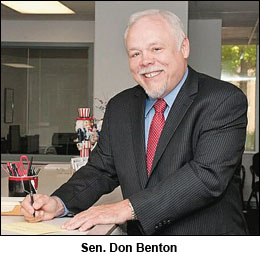 ► In today’s Columbian — Benton had hands full juggling his two jobs — A scan of Benton’s schedule in the 60 days of the 2016 regular legislative session shows a hectic schedule, but he no longer needs to juggle the two jobs…. Although Benton said he isn’t seeking re-election, that was before he was ousted from the county. There’s still time for him to change his mind, candidate filing week kicks off today.
► In today’s Columbian — Benton had hands full juggling his two jobs — A scan of Benton’s schedule in the 60 days of the 2016 regular legislative session shows a hectic schedule, but he no longer needs to juggle the two jobs…. Although Benton said he isn’t seeking re-election, that was before he was ousted from the county. There’s still time for him to change his mind, candidate filing week kicks off today.
► In the Columbian — Benton files whistleblower complaint against McCauley — Just weeks before Don Benton was ousted from his job heading the county’s Environmental Services department, the Vancouver senator filed a whistleblower complaint accusing Acting County Manager Mark McCauley of illegal actions and political retaliation.
► In today’s Spokesman-Review — Call to cancel Washington’s presidential primary came too late — State statutes require a presidential primary the fourth Tuesday in May, and only the Legislature can suspend it. It didn’t.
LOCAL
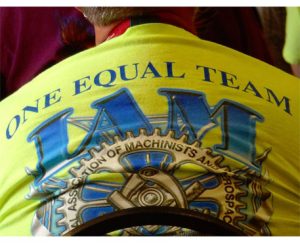 ► From KHQ TV — Machinists Union strike continues, gains support — Machinists Union members on strike against Triumph Composite Systems are gaining support from across the state and even across the nation Saturday. About 400 Spokane workers voted to strike on Monday. 94 percent of union members voted to reject the company’s three-year contract offer, and 93 percent also voted to strike.
► From KHQ TV — Machinists Union strike continues, gains support — Machinists Union members on strike against Triumph Composite Systems are gaining support from across the state and even across the nation Saturday. About 400 Spokane workers voted to strike on Monday. 94 percent of union members voted to reject the company’s three-year contract offer, and 93 percent also voted to strike.
ALSO at The Stand — Labor, community backs Triumph strikers
► In today’s NY Times — Amazon proves infertile soil for unions, so far — In early April, Kellen Wadach, an Amazon warehouse general manager, told hundreds of workers a troubling story about his family being abandoned by his father’s union. Flashing a photograph of himself as a boy with his father, he said the union did not help his family financially after his father died suddenly in front of their house, not even bothering to send a condolence card. The problem with Wadach’s story was that much of it appears to have been untrue. For years, Amazon has successfully battled to keep unions out of the company. And the incident involving Wadach was an illustration of how important it was to Amazon — or at least to some of its employees — to keep it that way.
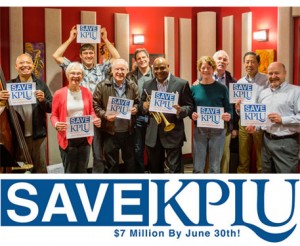 ► In the Seattle Times — UW had ‘Fight Club’ rule of secrecy about KPLU deal — Emails and records show UW and KUOW officials worked to keep details secret about the Seattle public radio station’s intentions to buy its competitor KPLU until the day university regents approved the plan. PLU, meanwhile, insisted on not revealing that it initiated the deal.
► In the Seattle Times — UW had ‘Fight Club’ rule of secrecy about KPLU deal — Emails and records show UW and KUOW officials worked to keep details secret about the Seattle public radio station’s intentions to buy its competitor KPLU until the day university regents approved the plan. PLU, meanwhile, insisted on not revealing that it initiated the deal.
ALSO at The Stand — Help save KPLU, the state’s only unionized NPR station
CAMPAIGN 2016
► From Huffington Post — Really, really rich Trump is no workers’ champion (by Leo W. Gerard) — Like all robber barons, Trump can’t spare a dime. He made that clear in the November Fox News debate. Trump said $7.25 is too much, too high a wage for the guy working two minimum-wage jobs to keep a roof over his widowed mother’s head or the single mother working 60 hours a week at two fast food joints to support her child.
FEDERAL GOVERNMENT
► From The Hill — Poll: Majority of Americans support universal healthcare — A majority of Americans are in favor of a federally funded healthcare system that provides insurance to all Americans, according to a new Gallup poll. Some 58 percent of respondents support replacing ObamaCare with a universal healthcare system, and 37 percent oppose that plan.
 ► From The Hill — How politics are getting in the way of building better roads and bridges — For years, there has been widespread agreement in Washington that the nation is facing an infrastructure crisis, with dangerously congested roads and deficient bridges threatening public safety and trade. Time and time again, lawmakers in both parties have expressed agreement that something should be done. Yet congressional attempts to revitalize the country’s transportation infrastructure — which now ranks 11th in the world after slipping from no. 1, according to the World Economic Forum — have gone nowhere.
► From The Hill — How politics are getting in the way of building better roads and bridges — For years, there has been widespread agreement in Washington that the nation is facing an infrastructure crisis, with dangerously congested roads and deficient bridges threatening public safety and trade. Time and time again, lawmakers in both parties have expressed agreement that something should be done. Yet congressional attempts to revitalize the country’s transportation infrastructure — which now ranks 11th in the world after slipping from no. 1, according to the World Economic Forum — have gone nowhere.
► From Reuters — Unions say Colombia’s not enforcing U.S. trade deal labor standards — U.S. and Colombian labor unions said the Colombian government failed to enforce worker protections in a free trade agreement with the United States, raising questions about similar provisions in a massive pan-Pacific deal. The complaint, to be filed with a division of the U.S. Labor Department, said threats and acts of violence against trade unionists in Colombia were neither properly investigated nor prosecuted.
NATIONAL
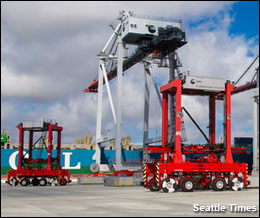 ► In the Seattle Times — Self-driving robots are the new longshoremen on L.A. waterfront — The Port of Los Angeles and TraPac, a unit of Mitsui O.S.K. Lines, are investing $693 million in four dozen self-driving cranes and automated carriers, plus related infrastructure. Of this amount, $63 million comes from the state of California. Terminal operators say they can’t afford the transition without government help… In Seattle and Tacoma, port officials are planning a new operations center that includes a goal of clean-energy productivity, but none of the companies working there have plans to introduce automated carriers anytime soon.
► In the Seattle Times — Self-driving robots are the new longshoremen on L.A. waterfront — The Port of Los Angeles and TraPac, a unit of Mitsui O.S.K. Lines, are investing $693 million in four dozen self-driving cranes and automated carriers, plus related infrastructure. Of this amount, $63 million comes from the state of California. Terminal operators say they can’t afford the transition without government help… In Seattle and Tacoma, port officials are planning a new operations center that includes a goal of clean-energy productivity, but none of the companies working there have plans to introduce automated carriers anytime soon.
► From The American Prospect — Confronting the parasite economy (by Nick Hanauer) — In the real economy, we solve the problems, build the things, and pay the wages that make America great… In the parasite economy — where companies large and small cling to low-wage business models out of ignorance or habit or simple greed — “good jobs,” and the economic dynamism they produce, are in short supply… The real economy delivers on the promise of capitalism. The parasite economy relentlessly undermines it.
TODAY’S MUST-READ
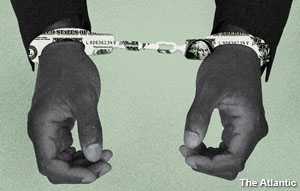 ► From NPR — Is America engaged in a ‘vicious circle’ of jailing the poor? — A new report documents that there are almost 12 million admissions to local jails each year, representing about 9 million people. Most of those jailed are being held for low-level offenses, such as drug misdemeanors, traffic offenses or nonviolent property crimes. And, adds Nancy Fishman of the Vera Institute, the majority are poor. She notes that most of the people in jail are pretrial, which means that they have not yet been convicted of anything. “They are legally innocent,” Fishman says. “One of the great travesties, frankly, of jail admissions right now is that we have people sitting in jail for long periods simply because they can’t afford to pay [bail].” She adds that being in jail often leads to increased poverty, because many jails charge fees to their inmates:
► From NPR — Is America engaged in a ‘vicious circle’ of jailing the poor? — A new report documents that there are almost 12 million admissions to local jails each year, representing about 9 million people. Most of those jailed are being held for low-level offenses, such as drug misdemeanors, traffic offenses or nonviolent property crimes. And, adds Nancy Fishman of the Vera Institute, the majority are poor. She notes that most of the people in jail are pretrial, which means that they have not yet been convicted of anything. “They are legally innocent,” Fishman says. “One of the great travesties, frankly, of jail admissions right now is that we have people sitting in jail for long periods simply because they can’t afford to pay [bail].” She adds that being in jail often leads to increased poverty, because many jails charge fees to their inmates:
“That pass-through [in] jails is damaging and has huge repercussions. You’re talking about people who often come in in fragile economic situations and end up that much worse by the time they get out.”
ALSO from the Atlantic — Debtors’ prisons in 21st Century America
The Stand posts links to Washington state and national news of interest every weekday morning by 10 a.m.





